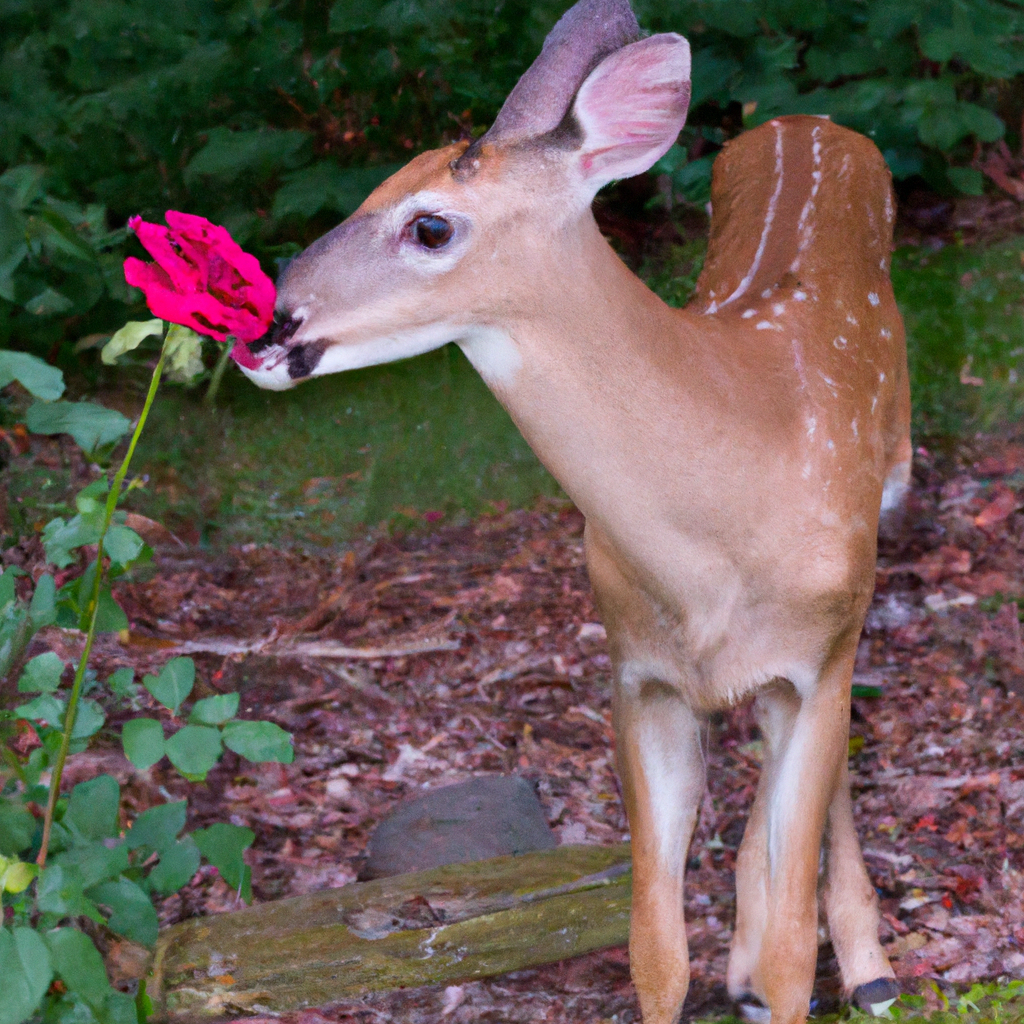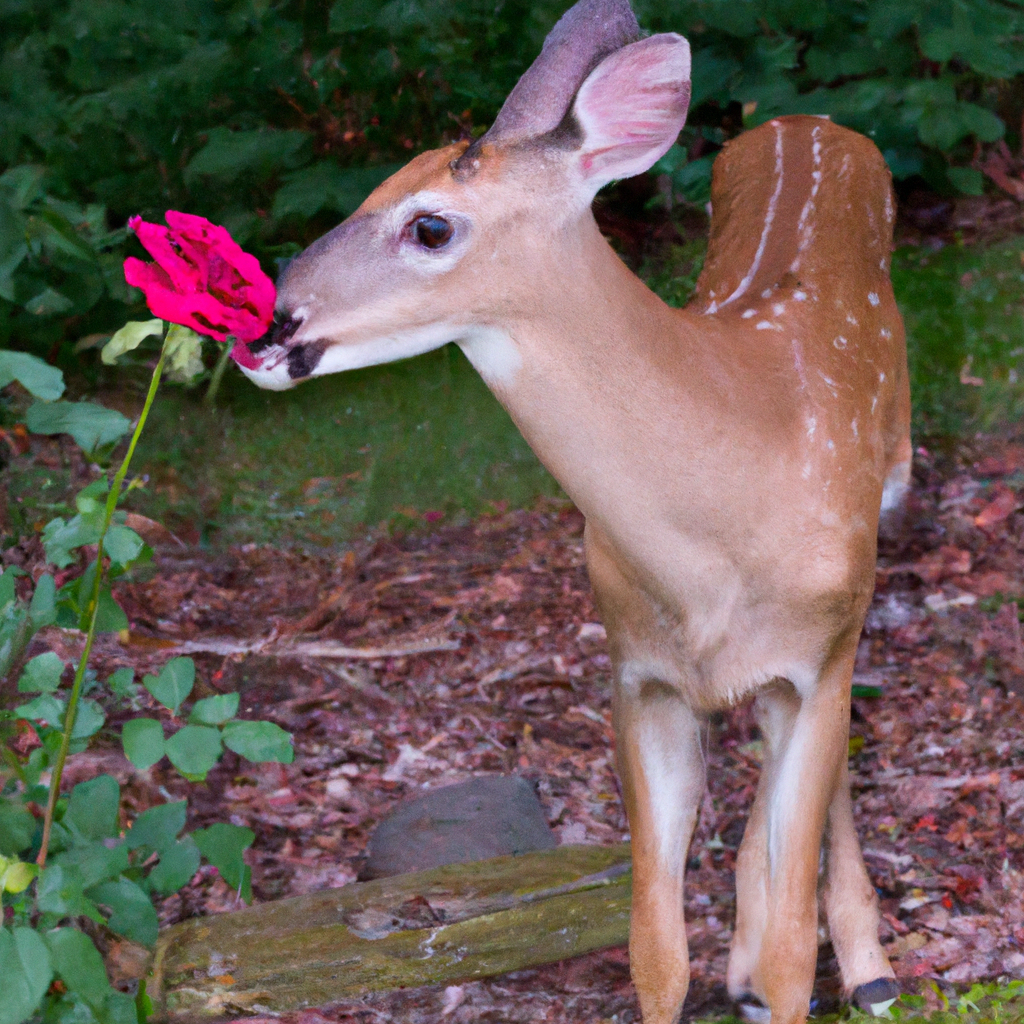
Do Deer Really Eat Roses?

Deer and Roses
Gardeners often find themselves asking, do whitetail deer eat roses? The answer, unfortunately, is a resounding yes. Deer are known to consume almost every part of rose plants, including foliage, buds, blooms, and even thorny canes. They are particularly fond of tender new growth, where thorns are not as sharp. With deer consuming up to 15 pounds of plant material daily, significant damage can be inflicted on rose gardens in a short amount of time. It is essential for gardeners living in deer-populated areas to take protective measures, such as using repellents, installing deer-resistant barriers, or opting for deer-resistant rose varieties. Hydrangeas are another type of flower that deer love to eat in the spring and summer.
Parts of the Rose Plant that Deer Prefer to Eat
Deer, particularly the Whitetail deer, are known for their voracious appetite for a variety of plants, including roses. These animals prefer to feed on the tender parts of the rose plant, such as the young shoots, flower buds, leaves, and even the blossoms. The high levels of vital nutrients, moisture, and palatability in these plant parts make them an excellent food source for deer, especially during periods of scarcity or when other natural food sources are unavailable.
Methods of Deer Proofing Roses
Deer proofing roses is essential for maintaining a healthy garden, as deer are known to enjoy munching on rose bushes, particularly the tender new growth. To protect your roses, consider using deer repellents, such as a mix of liquid dishwashing soap and hot sauce, which can be sprayed on and around the plants weekly.
Another method is to plant deer-resistant perennials around your roses, which can create a natural barrier. Alternatively, install high fencing, or even an electric fence, to keep deer away from your precious blooms. Remember to change up your methods occasionally to keep deer at bay.
The Extent of Deer Damage to Roses
Whitetail deer are known for their voracious appetite and their love for feasting on a wide range of plant species. To a varying degree, roses happen to be one of these plants that can fall victim to deer damage. While some rose varieties may be more resistant to deer nibbling, it is common for deer to strip the buds, leaves, and even the tender shoots, causing significant damage to the plant. Consequently, many gardeners who live in deer-heavy areas take preventative measures to deter these animals from their prized roses.
Creating a Buffer with Perennials Deer Hate
To protect your precious rose plants from deer, consider surrounding your rose bed with perennials that deer dislike. These plants act as a natural deterrent, keeping deer at bay and maintaining the beauty of your roses. Some deer-resistant perennials include lavender, yarrow, and marigolds. By incorporating these plants in your garden, you create a buffer that discourages deer from feasting on your roses while also adding variety and color to your landscape. Experiment with different plants to find a combination that works best for your garden and keeps those pesky deer away.
Changing up Deer Repellents
Changing up Deer Repellents: To protect your roses from hungry whitetail deer, it is essential to frequently switch up the methods and repellents used. Deer can become acclimated to certain deterrents, such as natural remedies or mechanical gadgets, and eventually ignore them. By regularly rotating the use of different repellents, be it sprays, barriers, or noise-makers, you are more likely to keep deer from eating your precious roses and causing significant damage to your garden.
Homemade Deer Repellent Recipe
If you have a garden full of roses and are struggling with deer feasting on your prized blossoms, consider trying a homemade deer repellent. A simple yet effective solution can be prepared by combining one egg, a half cup of milk, a tablespoon of cooking oil, and a tablespoon of liquid dish soap with one gallon of water. Spray this mixture on your roses, and the unpleasant smell and taste will deter deer, leaving your garden undisturbed and your roses in full bloom.
Using an Electric Fence or Traditional Fencing
Electric fences are a popular option for deterring deer from feasting on roses, as they deliver a harmless shock to the animal when touched. This method is often more effective than traditional fencing and requires less maintenance. However, some gardeners may prefer the aesthetic appeal of traditional fencing or worry about the safety of electric fences for pets and children around the garden. Ultimately, the decision between electric and traditional fencing should be based on personal preferences and specific needs for rose protection.
Deer-Resistant Rose Varieties
Although deer are known to graze on rose plants, gardeners can breathe a sigh of relief, as there are several deer-resistant rose varieties available. Rugosa roses are known for their impressive resistance to deer due to their prickly stems and strong fragrance. Additionally, shrub roses and climbing roses, such as Knock Out and New Dawn, respectively, are less likely to be devoured by deer compared to others. Planting these varieties increases the chances of enjoying beautiful roses in a deer-infested area.
